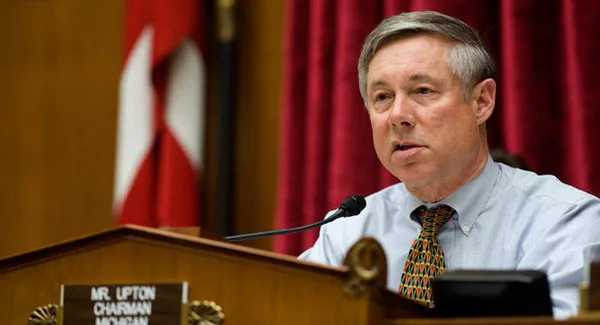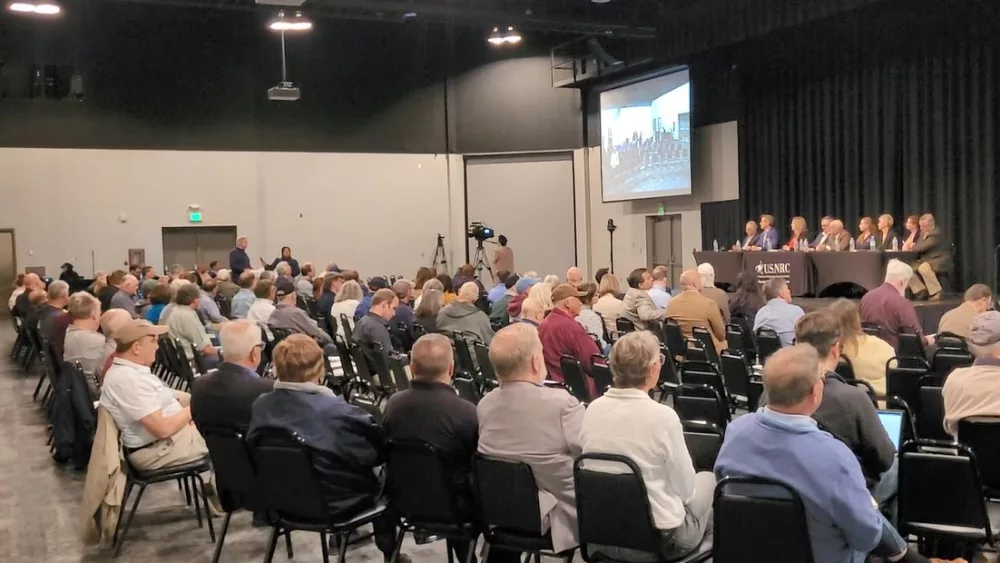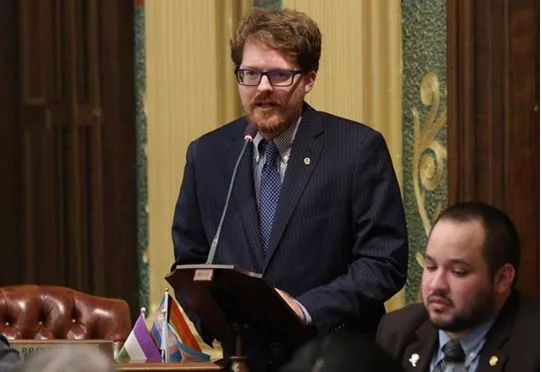As reaction continues to roll in on multiple fronts regarding this morning's announcement that the Palisades Nuclear Power Plant in Covert will be shutdown permanently in the fall of 2018, Congressman Fred Upton and a long time political activist, Kevin Kamps are among them.
Upton, who has been Chairman of the House Energy & Commerce Committee for the past five years, says the transition "should not be interfered with." The St. Joseph Republican released the following statement on the Entergy announcement that Palisades would be decommissioned and closed in 2018:
“Palisades has been part of the fabric of our Southwest Michigan community since 1971. They’ve employed thousands of workers – who in turn became respected leaders and so it’s important we do not turn our back on these hardworking folks now. They’ve also invested in our local schools and charities, had an enormous positive impact on our economy, and powered homes and businesses throughout the Midwest. But, as with all nuclear power plants across the country, there is always an end date. This safe transition is governed by the Nuclear Regulatory Commission and should not be interfered with. I strongly urge Entergy to remain committed to our community and I will continue working with them throughout this time of transition.”
Upton, as Chairman of the House Energy and Commerce Committee, has jurisdiction over nuclear energy and the Nuclear Regulatory Commission. In 2013, Upton toured Palisades and met with officials alongside representatives of the Nuclear Regulatory Commission (NRC). In 2014, Upton toured Palisades again with then-NRC Chairman Alison M. Macfarlane.
State Representative Al Pscholka is siding with his colleague State Rep Aric Nesbitt as shared in an earlier story on Moody on the Market. Here's Al's reaction as shared on Facebook:
"The closing of the Palisades Nuclear Power Plant is terrible news for our community. Hundreds of hardworking families could be displaced costing all of our communities, not only in terms of dollars, but also in the real contributions made by the Palisades' employees. I join my colleague Representative Aric Nesbitt in calling for Entergy to reconsider this decision."
Meanwhile, one of the most vocal critics of the nuclear plant issued a statement of his own today. Kevin Kamps of Beyond Nuclear issued a considerably longer statement in which he contends even two more years of operation is "too long":
"Entergy's announcement today that it will permanently shut down the Palisades atomic reactor by October 1, 2018 is most welcome to the large number of Michiganders, and beyond, who have fought so hard, for so long, to get it shut down.
Palisades has the worst embrittled reactor pressure vessel of any atomic reactor in the U.S., so nearly two more years of operation is a frightening prospect for a catastrophic release of hazardous radioactivity due to pressurized thermal shock fracture of the vessel.
Also, two more years worth of high-level radioactive waste will be generated, for which we have no good solution.
Palisades has also had countless security breaches, even since the 9/11 attacks, so the vulnerability to terrorism for two more years is also concerning.
We also have to remain vigilant that this good news isn't twisted into a nuclear hostage taking in Michigan. Just last week, Exelon Nuclear's lobbyists succeeded in their multi-year campaign to extort $2.35 billion from Illinois ratepayers, in order to keep open three atomic reactors that otherwise would have been closed. Also, in New York State, Governor Andrew Cuomo has in recent months inexplicably showered Exelon with $7.6 billion of ratepayer money, in order to keep four old, failing reactors operating for another 12 years. In both cases, jobs were cited as the reason why. We have to guard against such modern day nuclear robber barony at Palisades.
The good news is that, after permanent shutdown and removal of irradiated nuclear fuel from the reactor core, no more meltdown can happen, and no more high-level radioactive waste will be made.
Even after permanent shutdown, area residents and environmental watchdogs will have to remain vigilant, to make sure the dismantlement of the facilities, the clean up of the contaminated site and Lake Michigan sediments, and the management of the high-level radioactive waste on-site, are done safely and in the best possible way, both in regards to Palisades' workforce, and to area residents downwind and downstream.
In addition, a just transition must be put in place for both the Palisades workforce, as well as for the host community. Beyond Nuclear, Don't Waste Michigan, and others, so deeply concerned about Palisades for so long, have long pointed to renewable energy technologies such as wind, solar, and efficiency, as very promising alternatives to nuclear power, both for energy, and economic development, as well as for jobs. Of course, southwest Michigan's tourism and recreation economies, real estate and property values, and agricultural sector can now thrive and prosper, free from the radioactive stigma of an age-degraded, dirty and dangerous atomic reactor in their midst. The region can now better live up to its "Pure Michigan" advertisements.
But truth be told, there is a tremendous radioactive mess at Palisades that needs to be cleaned up, and high-level radioactive waste that must be safeguarded and isolated from the environment. This will provide a large number of jobs, for a long time to come. Who better to do this work than Palisades' current workforce, who know the site so well?
Regarding Entergy's offer of $10 million to southwest Michigan as economic development seed money, that is only two to three weeks' worth of net profits at Palisades, which has now operated for nearly a half-century, a decade of that under Entergy's ownership. Can't the multi-billion dollar corporation do better than that? After all, Entergy's CEO, Leo Denault, has made more than twice that himself in annual remuneration, as did his predecessor, J. Wayne Leonard.
Also, area ratepayers will see this as a welcome relief on their electric bills. As Tim Judson of Nuclear Information and Resource Service stated earlier this year, the Entergy Palisades-Consumers Energy Power Purchase Agreement (PPA) is the highest he has ever seen.
This has represented a gouging of ratepayers, and should never have been approved by the Michigan Public Service Commission (MPSC) in the first place.
Another thing MPSC should never have approved was the raid on the Palisades decommissioning fund, to the tune of $300+ million. Now there is talk of returning some of that money to the decommissioning fund. We will have to watchdog Entergy at every turn during decommissioning, to make sure that workers and the public are protected, and that the badly contaminated site is completely cleaned up, including radioactively contaminated groundwater, soil, and Lake Michigan sediments.
And of course, we'll have to watchdog the high-level radioactive waste for the next million years. We have long called for Palisades' catastrophically vulnerable storage pool to be emptied, and the irradiated nuclear fuel transferred to Hardened On-Site Storage. But the dry casks used at Palisades since 1993 are of poor quality design and manufacture themselves. Some are even defective. And both dry cask storage pads at Palisades are in violation of Nuclear Regulatory Commission (NRC) earthquake safety regulations, putting Lake Michigan at dire risk. But these poor quality casks are vulnerable to leakage over time, as well, simply due to corrosion and erosion. We will have to stay vigilant, and continue to call for HOSS, as close to the point of generation as possible, as safely as possible. Over 200 environmental groups from all 50 states, including numerous groups in Michigan, have called for this for the past 15 years now.
Importantly, the storage pool at Palisades must be maintained, albeit emptied of waste, even after decommissioning. This is so that in an emergency, if a dry cask has to be emptied, and its highly radioactive irradiated nuclear fuel transferred to a new dry cask, there is a place and way to do this. Once the pool is dismantled, we would be painted into a corner in this regard.
Last but not least, Palisades' closure, and the current dangers associated with its high-level radioactive waste storage pool and dry casks, should not be twisted into a call for export of the irradiated fuel in a rushed, unwise manner. We join with groups nationwide in continuing to oppose the proposed dump-site at Yucca Mountain, Nevada, on Western Shoshone Indian land, a scheme U.S. Rep. Fred Upton (R-St. Joe) has long championed in Congress. We also continue to oppose centralized interim storage, more accurately described as de facto permanent parking lot dumps. These too are most often targeted at low income, people of color communities, an environmental injustice, radioactive racism. Whether so-called interim storage, permanent disposal, and the risky shipments that would be required to move the wastes, decisions must be based on top notch scientific suitability, environmental justice, and free, fully informed consent-based principles. No current proposals meet such tests."






